Profile: Other UK parties
A look at some of the smaller parties who may pose a threat in the election.
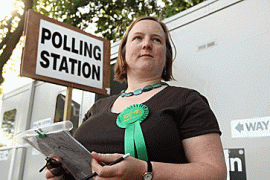
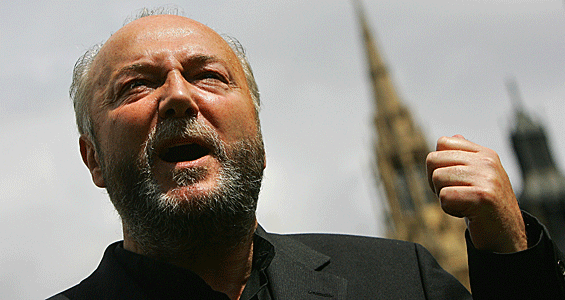 |
| George Galloway is the outspoken leader of the Respect party [GALLO/GETTY] |
A number of smaller parties taking part in Britain’s May 6 elections could help decide the outcome by taking away votes from the three main parties in crucial seats.
Al Jazeera takes a look at the groups and their leaders.
| GREEN PARTY |
Britain’s Green party is hoping for a breakthrough in the 2010 parliamentary elections.
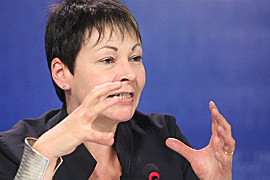 |
| Caroline Lucas was elected as one of the Green party’s first European MPs [EPA] |
The Greens, which will field about 330 candidates for the 650-seat parliament, won 8.6 per cent of the vote in last year’s elections for the European Parliament, taking two seats, the same number as in 2004 and 1999.
The party, which was formed to promote environmental policies, enjoyed its best poll performance in the 1989 European elections
It won 14.5 per cent of the vote that year, but that success has failed to translate into longer-term electoral gains.
It is hopeful of success in three constituencies: Brighton Pavilion on the English southcoast; Norwich South in eastern England; and Lewisham Deptford in south London.
Caroline Lucas, the party leader, was elected as one of the party’s first European MPs (MEP) in June in 1999, and re-elected in 2004.
The 50-year-old joined the party in 1986, but did not become its leader until September 2008, when the group abandoned its tradition of collectivism.
She told the Guardian newspaper in an interview last year the decision was taken to give the party a face.
| In depth |
|
|
“It was in recognition of the fact that people don’t really relate to abstract ideas, they relate more to the people who embody them.”
Aside from environmental policies and activisim, Lucas has been a high-profile campaigner against the war in Iraq and called for a complete ban on the production and use of Depleted Uranium Weapons.
| UK INDEPENDENCE PARTY (UKIP) |
Ukip, a right-wing anti-European party, has also not managed to turn success at the European elections into domestic parliamentary success.
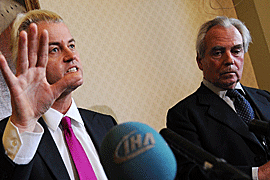 |
| Pearson, right, attracted controversy when he invited Geert Wilders, left, to the UK [EPA] |
Last year the party came second nationally in the European poll, taking 16.5 per cent of the vote and winning 13 seats.
The party will be fielding more than 500 candidates in the May 6 election and tends to garner support from former Conservative supporters who share its opposition to the European Union.
Lord Malcolm Pearson of Rannoch, Ukip’s leader, came to prominence recently by inviting Geert Wilders, a right-wing Dutch MP, to show his anti-Islamist film Fitna in the House of Lords.
Pearson argued that the screening of the film, which urged Muslims to tear out “hate-filled” passages from the Quran and juxtaposes images of the September 11, 2001 attacks with quotations from the text, was a “matter of free speech”.
The 67-year-old began his career in finance, founding an insurance brokers. He entered the House of Lords as a Conservative in 1990 when Margaret Thatcher, former prime minister, offered him a peerage.
He left the Conservative party in 2004 after urging voters to back Ukip, in line with his eurosceptic views.
He joined Ukip in 2007, saying that David Cameron, the Conservative leader, was not telling the British people about the disadvantages they faced because of the UK’s membership of the EU.
| BRITISH NATIONAL PARTY (BNP) |
The BNP is possibly one of Britain’s better known smaller parties, due to its controversial anti-immigration policies.
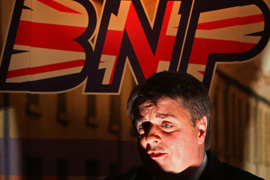 |
| Nick Griffin was convicted in 1998 of inciting racial hatred [EPA] |
It made headlines last year when it won two seats in the European elections, its first major success in the country.
Although the party has not gained widespread backing, it has won growing support in some predominantly poor, white and working class areas.
There is a chance it could take votes from both Labour and the Conservatives in a number of urban constituencies.
Nick Griffin, the BNP’s leader, has questioned whether the Holocaust took place and has been convicted of inciting racial hatred.
Born in 1959, Griffin came from a family with a history in right-wing politics. He has said that at the age of 13 he had started reading Hitler’s Mein Kampf, which he described as “very useful”.
At university he became involved in the National Front, a party that stood for “white family values”, but left the party in 1989.
In 1995 he joined the BNP. Three years later he was convicted of inciting racial hatred after co-authoring a pamphlet about “Jewish conspiracies”, and received a two-year suspended prison sentence.
Griffin became leader of the party in 1999, using his Cambridge-educated background to portray himself as a mainstream politician.
He made headlines in 2006 when he and a colleague were cleared of race hate charges relating to a speech in which he described Islam as a “wicked, vicious faith” and said Muslims were turning Britain into a “multi-racial hell hole”.
Griffin has insisted that the BNP is not a racist organisation and his party has attempted to widen its appeal by adding environmental concerns to its policies.
| RESPECT PARTY |
Respect, a left-wing party formed in 2004 amid anger over the invasion of Iraq, is best known for its outspoken leader George Galloway.
Despite a lack of national support, Galloway upset the odds in 2005, winning a seat in Bethnal Green and Bow in east London, a deprived area with a high proportion of ethnic minority and Muslim voters.
Galloway, who promised only to serve one term, will be contesting a neighbouring constituency in this election and commentators say he again has a chance of success, as does his Respect replacement candidate in Bethnal Green and Bow.
Born in 1954 in Dundee, Scotland, Galloway began his career as a Labour party organiser and quickly climbed the ranks, becoming an MP in 1987.
Galloway is known for his political activism, campaigning in favour of the Palestinians and against the war in Iraq.
His views on the 2003 invasion saw him expelled from the Labour party in 2003, remarks which the party’s chairman said “incited foreign forces to rise up against British troops”.
The Respect leader has sparked controversy outside the political arena, facing inquiries over finances at an anti-poverty charity and his links with Saddam Hussein, the former Iraqi president.
In January 1994, Galloway was shown praising Saddam, but he insists he had always opposed the Iraqi leader’s government.
He made international headlines in 2005 when he appeared before the US Senate after being accused of profiting from Iraq oil dealings.
He managed to use his testimony to attack American foreign policy, calling the investigation the “mother of all smokescreens” to divert attention from the “pack of lies” that led to the invasion.
